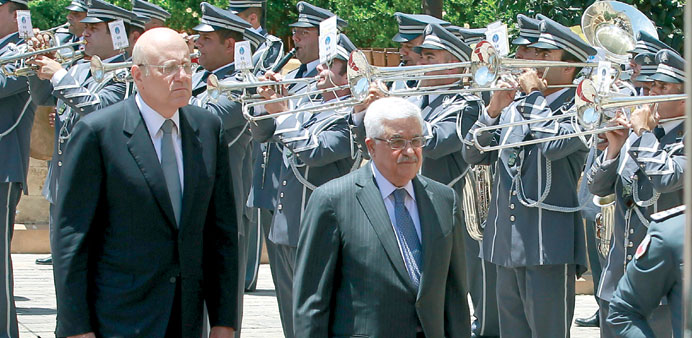Lebanese Prime Minister Najib Mikati (left) and Palestinian President Mahmoud Abbas review honour guards at the Government palace in Beirut as Abbas began a three-day official visit to Lebanon.
Reuters/Ramallah/Gaza
Palestinian President Mahmoud Abbas yesterday praised Egypt’s military for toppling President Mohamed Mursi and his Muslim Brotherhood, the ideological ally of Abbas’s Hamas rivals.
The fall of Mursi’s government deprived Hamas of a sympathetic neighbour, and may strengthen Abbas’s chances of nudging Hamas toward a long-delayed reconciliation and power-sharing pact.
By intervening to remove Mursi, the Egyptian army had prevented Egypt’s “slide toward an unknown fate”, Abbas said.
Yasser Abed Rabbo, a top official in the Palestine Liberation Organization headed by Abbas, said: “This is a historic day for Egypt, and we are learning a lesson from the Egyptian example. Hamas should take note of what popular will can achieve.”
Palestinians are riven by political and cultural splits that mirror Egypt’s. A Hamas victory in 2006 parliamentary polls led to a short civil war which left the Islamists ruling Gaza, while Abbas’s Fatah faction holds sway in the West Bank.
Hamas officials largely shunned the media yesterday, and the movement took no position on the sudden removal of Mursi.
“We pray to God to preserve the security and the stability of Egypt and its people and to prevent bloodshed,” a Hamas spokesman, Ehab Ghussein, told Reuters.
The group had seen its star rise in the Arab world following a tide of uprisings in 2011 that swept religious-inspired governments to power in Tunisia and Egypt.
Egypt’s prime minister, along with an Arab League delegation, came to the territory last November, even as Hamas and Israel fought an eight-day war.
Hamas’s muted response may signal its caution at upsetting an Egyptian military that controls Gaza border lifelines.
“It would be wrong to say relations won’t be affected. Relations could become cold for a period,” said Hamas official Mustafa Assawaf, who stressed he was speaking as a political analyst about future ties with Egypt’s new government.
Hamas leaders and supporters greeted Mursi’s election last year with delight, believing his leadership would usher in the beginning of the end of an Israeli-Egyptian blockade on Gaza and a near-total international diplomatic quarantine.
But the Brotherhood, buffeted by Egypt’s internal storms and exercising little authority over the security forces, furnished Hamas with few concrete advantages.
In recent weeks, Egypt’s army, citing security concerns as it confronts Islamist militants in the Sinai desert, has stepped up a crackdown on border tunnels with Gaza through which food, fuel and weapons are smuggled.
The campaign has dismayed Hamas and pushed up prices in the impoverished coastal enclave.
Gaza residents say that dozens of Egyptian troops have reinforced the border areas since mass protests calling for Mursi’s ouster began on June 30. The army also controls the Rafah border terminal, Gaza’s main link to the outside world.
Tunisian rulers bemoan ‘coup against legitimacy’
Tunisia, the birthplace of the Arab Spring pro-democracy uprisings, yesterday criticised the Egyptian army’s removal of elected president Mohamed Mursi as “a coup against legitimacy” and urged Cairo to guarantee his safety.
“Military intervention is totally unacceptable and we call on Egypt to ensure that Mursi is physically protected,” said President Moncef Marzouki. “We view what is happening in Egypt with concern - the arrests of journalists and politicians.”
Tunisia’s ruling Ennahda party denounced also what it called a “coup against legitimacy” in Egypt. “Ennahda rejects what happened and believes legitimacy is represented by President Mursi and no one else,” Ennahda said in a statement.
It said it feared that “this coup will fuel violence and extremism” and induce despair in the value of democracy.
The role of Islam has grown in Tunisian society and been enshrined in a new constitution since Ennahda’s election in 2011, but religious-secular divisions are seen as less severe and volatile than in Egypt.
Last March, Ennahda responded to pressure from the secular opposition and accepted the appointment of independent ministers to deflect acccusations that it aimed to control all aspects of the state and stifle social freedoms. Ennahda now co-governs with two secular parties.

